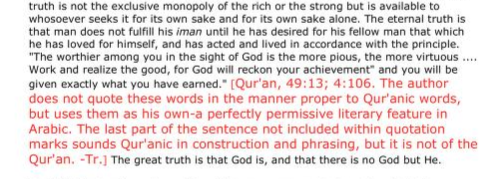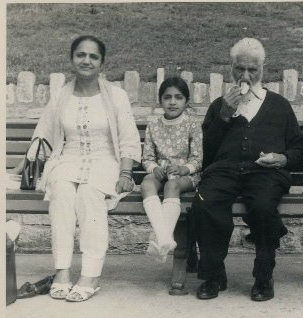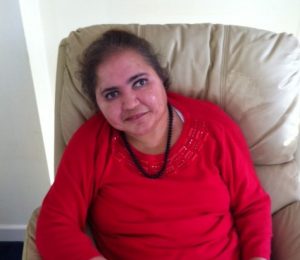This post is in further reference to the first part of my post of 2015 at this link, where I replied to the allegation that what Hazrat Mirza Ghulam Ahmad quoted as a verse of the Quran "does not exist".
There is a hadith in Sahih Bukhari, reported by Anas, whose translation by Muhsin Khan begins as follows:
Zaid bin Haritha came to the Prophet (ﷺ) complaining about his wife. The Prophet (ﷺ) kept on saying (to him), "Be afraid of Allah and keep your wife." Aisha said, "If Allah's Messenger (ﷺ) were to conceal anything (of the Qur'an) he would have concealed this Verse."
(See this link for the translation as well as the original Arabic.)
Does the statement given in this hadith, "Be afraid of Allah and keep your wife" (اتَّقِ اللَّهَ، وَأَمْسِكْ عَلَيْكَ زَوْجَكَ), occur anywhere in the Quran? According to the criterion applied to Hazrat Mirza Ghulam Ahmad's writings by his opponents, no such verse exists in the Quran which contains this statement.
Of course, what this hadith is referring to is the verse 33:37 which contains the statement: "Keep your wife and be afraid of Allah" (اَمۡسِکۡ عَلَیۡکَ زَوۡجَکَ وَ اتَّقِ اللّٰہَ).
No one with any sense of fairness or having the least commonsense would say that there is any material difference between the statement as quoted in this hadith and the same statement as it occurs in the Quran.
Will our opponents allege that someone in this hadith has quoted a verse "which does not exist"? Will our opponents say, absurdly, that the Holy Prophet had actually uttered the words to Zaid "Be afraid of Allah and keep your wife", but Allah when revealing the Quran misquoted the Holy Prophet and wrongly stated that the Prophet had said: "Keep your wife and be afraid of Allah"?
It is our opponents who now need to answer these questions.
However, to introduce a little commonsense into the matter, please read below.
The Life of Muhammad is the English translation of a voluminous Arabic biography of the Holy Prophet by the late Muhammad Husein Haykal of Egypt, one of the greatest writers of modern Arabic literature, and a renowned novelist, politician and journalist. The translation was done by Ismail Ragi Al -Faruqui, a reputable scholar of Islam.
The following passage occurs in this translation:
'The eternal truth is that man does not fulfil his iman until he has desired for his fellow man that which he has loved for himself, and has acted and lived in accordance with the principle, "The worthier among you in the sight of God is the more pious, the more virtuous … Work and realize the good, for God will reckon your achievement" and you will be given exactly what you have earned.'
(Bolding is mine. Chapter Conclusion in two Essays, Essay II, p. 569. Edition published by Shorouk International of London and Cairo, 1983)
Referring to the quotation in this extract (which I gave in bold text above), the translator has added a note at this point which is as follows:
"Qur'an, 49:13; 4:106. The author does not quote these words in the manner proper to Quranic words, but uses them as his own — a perfectly permissive literary feature in Arabic. The last part of the sentence not included within quotation marks sounds Quranic in construction and phrasing, but it is not of the Qur'an. — Translator."
(Notes and References, note 15 of Essay II, p. 611).
Shown below is a screenshot of this passage from the version of this book at www.archive.org (see link):

(In my printed edition, the translator's footnotes occur as endnotes at the end of the book, and not inserted within the text in red colour as in the pdf edition above.)
Haykal has given a quotation consisting of three segments beginning respectively as follows: (1) The worthier among you… (2) Work and realize the good… (3) and you will be given …
The translator says in his note that (1) and (2) are from the Quran, taken from 49:13 and 4:106, and that (3) is not from Quran although it sounds Quranic. He says that the author is using the words of the Quran "as his own", which is "a perfectly permissive literary feature in Arabic". This is a sufficient answer to those opponents who pick out a few places from the writings of Hazrat Mirza Ghulam Ahmad to allege, without any justification, that he has misquoted the Quran.
I may add here the following observation, as an aside, and not related to my main point.
Firstly, the translator has made an error in giving reference to 4:106. The verse of the Quran corresponding to the words "Work and realize the good, for God will reckon your achievement" is, in fact, 9:105.
Secondly, as regards segment (3) of Haykal's quotation ("and you will be given…"), I have looked up Haykal's original Arabic book and display from it below the image of the relevant text (this book is also available at www.archive.org and the text below is on p. 558-559):

Haykal's words in Arabic are: Wa lā tujzauna illā mā kuntum taksibūn.
I think this is a mixing of 36:54: Wa lā tujzauna illā mā kuntum ta‛lamūn ("you are only recompensed for what you did").
with 10:52: Hal tujzauna illā bi-mā kuntum taksibūn ("you are only recompensed for what you earned").
It is perfectly legitimate to say that, in this final case too, Haykal is quoting from the Quran, even though he has substituted a word from 10:52 into 36:54.




According to an article published by BBC Urdu the total number of Ahmadiyya community in India is One hundred thousand.…
----Jul 27, 18:49